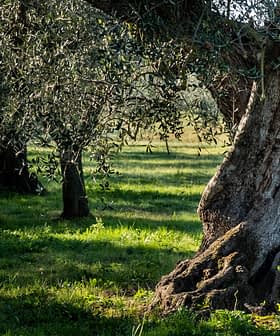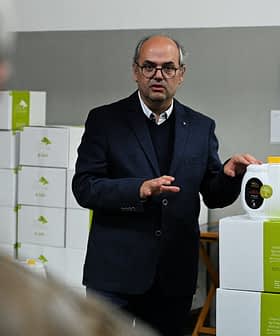
Many Greeks involved in the olive oil industry are in an uproar over a proposal presented to the Greek government to blend their product with cheaper oils like soybean, corn and sunflower oil. If implemented, supporters claim it would help boost the country’s weak economy.
Increasing Competition
The Hellenic Competition Commission presented the Greek parliament with their proposal which included producing cheaper blended olive oil that would be labeled as such. So far, the Greek government is not moving ahead with it. However, the very consideration of the idea has upset many committed to the industry, on many levels.
“The health of Greek people is better than in the other places in the world and that is proven in studies. The main reason is olive oil which is what our very diet is based on,” said Vassilia Fragaki, the President of Cooperativa Sitia which is a union of extra virgin olive oil producers on the Greek olive oil producing island of Crete. In an interview with Olive Oil Times, Fragaki said the proposal is a serious issue when you consider that the economic crisis could compromise health.
“Definitely we are against viewpoints like cheap oils. In Greece, we still promote gathering raw food. We are planting our own vegetable gardens and of course producing and consuming natural extra virgin olive oil.”
As it stands, it is against the law for Greek olive oil producers to blend their olive oil with other oils. The Hellenic Competition Commission based their findings on research by the Organization for Economic Cooperation and Development (OECD) which is an international economic organization founded to stimulate economic progress and world trade. The OECD concluded there are benefits to the proposal. For example, blended cheaper oils would be more affordable to low-income families.

During a session in Greek parliament, the Deputy Minister for Rural Development, Maximus Charakopoulos, said that the proposal would create a more competitive environment for Greek olive oil producers. “We aspire in this way to close the gap in the price of production to the store shelf.”
In response, Greek MP, Fevronia Patrianakou, said the OECD proposal is, “a cause for war.” During the parliament session she also said, “We strive to highlight the quality features of our products. There is no way we should accept proposals that distort the truth of what really makes it on the store shelf.”
Blended in the Market
“I am really wondering how much cheaper oils can be made,” said Efthimios Christakis, who specializes in promoting and marketing Greek olive oil in Germany. He pointed out that blended oils have been on the market for years and are sold at a low price point already. Allowing blended Greek oils in the market will do nothing but harm the Greek olive oil industry, an industry that has been slowly building up in a positive way.
“For years now we have made and continue to make a big effort so that Greek olive oil can build its reputation in the global market and really show off its identity, one that is associated with quality.”
That identity comes from a strong base. The Greek olive oil culture dates back to ancient times and today Greeks consume the most olive oil in the world, about 18 liters per person, each year. However, due to weak branding and marketing efforts, Greece’s quality excess olive oil is usually trucked off and sold as a bulk product to be mixed with olive oil from countries like Italy and Spain.
“Concentrating on quality, rather than cheap blends, is very important. Quality is what will lead us to better pricing and reduce the bulk. In the process Greece can increase its hold in the market for the bottled and branded products.”
More than Money
Fragaki said the health benefits, proven to derive from pure Greek olive oil are enough to understand just how unique the product is, a product that shouldn’t be tainted with.
“This should not be ignored. The king of oils is the extra virgin olive oil. It is a treasure.” She pointed out the difference, explaining that the investment in consuming a few spoons of high quality Greek olive oil versus buying a large plastic package of a cheap blend is worth the benefits for any consumer and that should be the value.
Christakis agreed. He also highlighted that Greek olive oil remains a symbol of culture and health and a part of daily consumption for the Greek people. Those are just a few more reasons the idea of a blended version should be be tucked away, permanently.
“My opinion is that Greeks should focus aggressively on the right quality and promoting Greek olive oil’s authentic identity. We should let other countries, where they simply do not have a large amount of extra virgin olive oil, market the fake mixes and chemical innovations.”








